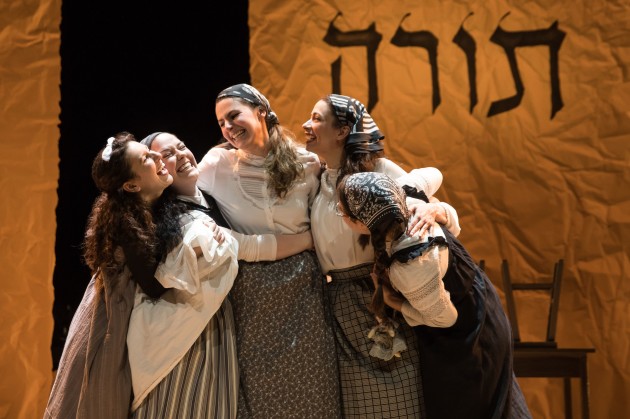Tag : theater
February 6, 2020 by admin
Anne and Her Shadows
I have kept her photograph, which I purchased twenty-five years ago on my first trip to the Anne Frank House. I embarked on the narrow climb to the hiding place and later, the descent, and imagined all that had occurred in between. I was attuned to the voices of visitors speaking other languages as I looked out a window and considered the view and the sounds of Amsterdam’s streets and wondered if this is what Anne saw and heard. At that point, I withheld no emotion and unabashedly cried in front of everyone else in that room.
Only recently have I begun to comprehend the extent of her profound influence on my writing and working life which began with a spring play. As a fourteen-year-old, I auditioned for and won the role of Anne in my high school’s production of The Diary of Anne Frank. At that time, I had already read the Diary and attempted to watch a television dramatization, but couldn’t do so in one sitting as I darted in and out of the living room because of a seven-year-old’s fear. I didn’t know if what I was watching, a family living in hiding, was still happening. I wondered: “If the Frank family is in hiding, shouldn’t I be as well?”
Although the scenes appeared as mere shadows and whispers, I couldn’t make them disappear. With age came a clearer sense of past and present. Being on stage playing Anne protected me from those fears. I was engulfed in performing well without a single dropped line or missed cue. But as the fear abated, something else quietly manifested, an inner sense of responsibility.
- 2 Comments
February 26, 2019 by Aileen Jacobson
Fiddler on the Roof (in Yiddish!) and Feminism
 Performing “Fiddler on the Roof” in Yiddish isn’t just a gimmick. The intimate production now playing at Manhattan’s Stage 42 adds warmth, depth and freshness to the all-too-familiar 1964 musical. It invites a new focus on the meanings of a show that starts out celebrating “Traditsye,” as the rousing opening number is called, and then delineates the demise of some of those notably sexist traditions, like arranged marriages and fathers deciding the fates of their daughters. And yet it’s bittersweet, as these new viewpoints arrive in the midst of a painful ripping apart of a vibrant, cohesive community. This National Yiddish Theatre Folksbiene production played for six months at the Museum of Jewish Heritage on Battery Place, where it extended and sold out four times, before moving uptown to 42nd Street, a more convenient location for many theatergoers.
Performing “Fiddler on the Roof” in Yiddish isn’t just a gimmick. The intimate production now playing at Manhattan’s Stage 42 adds warmth, depth and freshness to the all-too-familiar 1964 musical. It invites a new focus on the meanings of a show that starts out celebrating “Traditsye,” as the rousing opening number is called, and then delineates the demise of some of those notably sexist traditions, like arranged marriages and fathers deciding the fates of their daughters. And yet it’s bittersweet, as these new viewpoints arrive in the midst of a painful ripping apart of a vibrant, cohesive community. This National Yiddish Theatre Folksbiene production played for six months at the Museum of Jewish Heritage on Battery Place, where it extended and sold out four times, before moving uptown to 42nd Street, a more convenient location for many theatergoers.
Within the comfortable fold of “Fiddler,” the production’s English translations hardly seem necessary. Many theatergoers know the dialogue and lyrics by heart. Or think they do. Reading the English words as they are projected on the set forces a new kind of attention.
- 1 Comment
January 10, 2019 by admin
The Chutzpah of Sarah Bernhardt
Sarah Bernhardt had chutzpah. This illegitimate daughter of a Dutch Jewish courtesan had already gained wide renown as the best actress of her day when she decided to take on an exceptionally highprofile, high-risk role: She wanted to play Hamlet. Not girlfriend Ophelia or mother Gertrude, but the Danish prince himself, considered by many to be Shakespeare’s most difficult and iconic character.
It was a glass-ceiling-breaking move, one among several in Bernhardt’s career, and it inspired playwright Theresa Rebeck to build a play, set in 1897, around Bernhardt’s struggles. First Bernhardt had to overcome the dismissive skepticism of some men: “It’s grotesque. If Shakespeare meant for Hamlet to be a woman, he would have named the play ‘Hamlet, Princess of Denmark’.” Rebeck has one critic protest.
But countering those kinds of arguments was easy for the Divine Sarah, according to Rebeck’s snappy and finely observed play, which recently had its world premiere in a Roundabout Theater production on Broadway. “Why shouldn’t I play Hamlet? I am perfectly suited. Nobody cares about his masculinity. So called. They care about the magnificent nuance of his heart,” says the play’s Sarah, mirroring the real Sarah’s boldly modern notions.
At one point in the new play, Bernhardt complains that she is tired of dying every night, as many of her female roles require. Alphonse Mucha, an artist who paints her theater’s posters, points out that Hamlet dies, too. “But he kills as well,” Bernhardt says. Women, on the other hand, “never get to kill anyone.”
AILEEN JACOBSON, The Lilith Blog, October 11, 2018.
- No Comments
November 6, 2018 by Aileen Jacobson
Gloria Steinem’s Life, Onstage

(L-R) Joanna Glushak, Fedna Jacquet, Francesca Fernandez McKenzie, Christine Lahti, Patrena Murray, DeLanna Studi, and Liz Wisan in GLORIA: A Life by Emily Mann, directed by Diane Paulus, at the Daryl Roth Theatre. Photo © Joan Marcus.
As I entered a Midtown Manhattan building a couple of years ago, I spotted a slim familiar-looking woman with blond hair rushing out. Wide-eyed, I asked the two thirty-something security guards–one male, one female–“Was that Gloria Steinem?”
They replied, “Who’s Gloria Steinem?”
A few days later, I related my astonishment about the guards’ reaction to two other thirty-somethings–one male, one female–whom I know to be college-educated, media savvy and squarely in favor of equality for women.
They, too, asked, “Who’s Gloria Steinem?”
- No Comments
April 3, 2014 by admin
Theater
In this new folk opera, with its bawdy and edgy alternative story of Creation, you’ll meet Adam’s first wife. Lilith refuses to lie beneath Adam and flees to the Red Sea, creating, then killing, 100 demon babies a day, until the three angels sent by God negotiate a deal with her. “Lilith the Night Demon in One Lewd Act” premiers in May from the Berkeley-based musical group Veretski Pass. Cookie Segelstein, founder, director and violinist of Veretski Pass, says, “This piece goes from raucous burlesque to sad and serious, more about the function of superstitions against the tragedy of infant mortality.”
The medieval Lilith story (at liliththenightdemon.com) reminds us how myths and legends keep females in line. A not-so-hidden sub- text: speaking out for equality, and for yourself, may be steps on the path to demonization. This Lilith becomes the embodiment of the bad things projected onto women: frigid, yet she seduces boys and men; sterile, yet she has 100 demon children every day. You get it.
- No Comments
 Please wait...
Please wait...